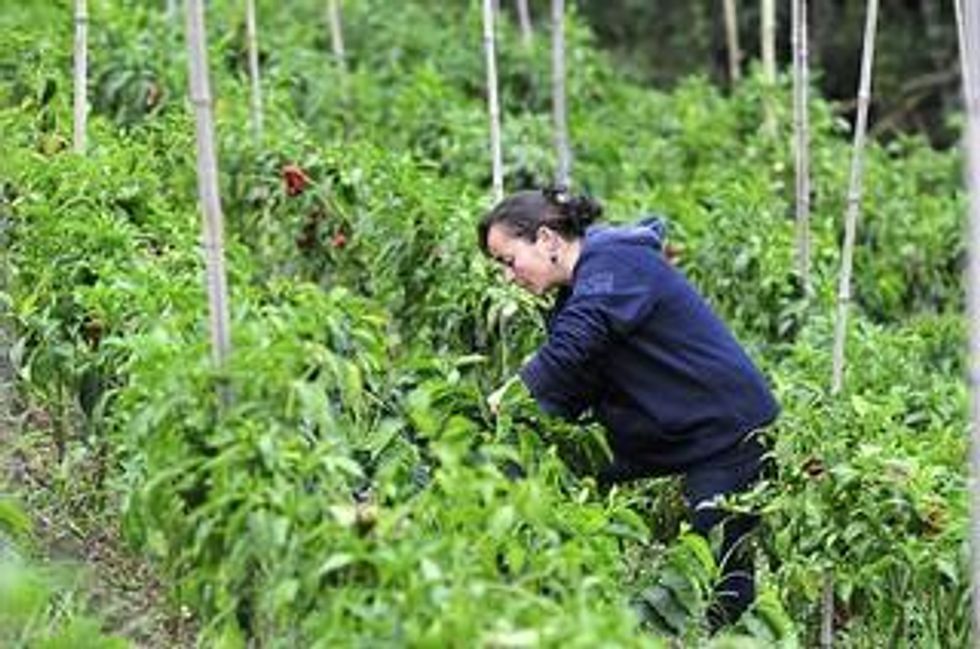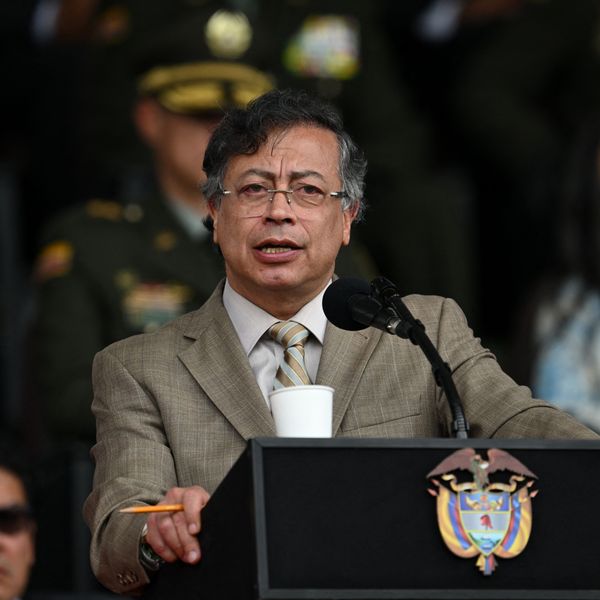Are Colombian Protests the 'Opening Salvo in a Full-Frontal Attack' on Free Trade?
The South American country's recently enacted free-trade deal with the United States is devastating for its farmers.
After shutting down major highways and key trucking routes for nearly two weeks, two million farmers and workers brought the Colombian government to the negotiating table to reform trade policy.

While peace negotiations between the Colombian government and FARC rebels continue in an effort to end a brutal, five-decade-long war, a less-publicized problem -- a harsh, unbridled free-trade economic system that is devastating farmers -- has reached a boiling point.
As many as 2 million Colombians took their protest to the highways of the country in August, met by tens of thousands of members of their nation's security forces and brutal repression.
Based on reports from the Red Cross and human rights organizations, security forces cracked down on protesters with accounts of forces breaking into farmers' homes, shooting tear gas from helicopters, firing weapons indiscriminately, and even sexual abuse.
This may be just the opening salvo in a full-frontal attack on the recently enacted U.S.-Colombia Free Trade Agreement.Because of the impact of the protests, which paralyzed the capital of Bogota, Colombian President Juan Manuel Santos was forced to acknowledge the lack of effective agricultural policy, equating the mass unrest to a "storm" caused by the "absence of agricultural policies for a long time."
For the protestors, however, it's not the absence of agricultural policies, but one menacing policy in particular that has them up in arms: the U.S. free trade agreement, implemented last May. The U.S.-Colombia Free Trade Agreement prohibits the very policies the United States uses to prop up Big Ag, such as subsidies. In this unequal playing field, what can Santos do to support Colombian growers and workers?
Take the crisis of the Colombian dairy industry, for example. Faced with a saturation of U.S. dairy products in the Colombian market, farmers gave away or dumped milk in the months leading up to the strike, claiming that production costs were too high to compete with U.S subsidized products. Before the agreement was signed in 2011, Oxfam reported that 1.8 million farmers would see a significant drop in their income in the wake of a free trade agreement with the United States, with 400,000 of the poorest farmers set to lose up to 70 percent of their income.
Neither brutal repression nor offers of band-aid solutions will solve the structural problem.Now, rice, potato, sugarcane, onion, coffee, cocoa, and livestock farmers joined by miners, truck drivers, health care workers, and students are protesting to demand an end to free trade policies that enrich U.S. corporations at the expense of small-scale farmers and workers.
The sheer desperation of poverty in Colombia's breadbasket has spurred the mass protest on the commercial byways of Colombia, and neither brutal repression nor offers of band-aid solutions will solve the structural problem. The farmers demanding an end to free-trade policies that failed in their promise to increase prosperity for Colombians are screaming at the top of their lungs that the emperor has no clothes.
Can you hear them now?
An Urgent Message From Our Co-Founder
Dear Common Dreams reader, The U.S. is on a fast track to authoritarianism like nothing I've ever seen. Meanwhile, corporate news outlets are utterly capitulating to Trump, twisting their coverage to avoid drawing his ire while lining up to stuff cash in his pockets. That's why I believe that Common Dreams is doing the best and most consequential reporting that we've ever done. Our small but mighty team is a progressive reporting powerhouse, covering the news every day that the corporate media never will. Our mission has always been simple: To inform. To inspire. And to ignite change for the common good. Now here's the key piece that I want all our readers to understand: None of this would be possible without your financial support. That's not just some fundraising cliche. It's the absolute and literal truth. We don't accept corporate advertising and never will. We don't have a paywall because we don't think people should be blocked from critical news based on their ability to pay. Everything we do is funded by the donations of readers like you. Will you donate now to help power the nonprofit, independent reporting of Common Dreams? Thank you for being a vital member of our community. Together, we can keep independent journalism alive when it’s needed most. - Craig Brown, Co-founder |
After shutting down major highways and key trucking routes for nearly two weeks, two million farmers and workers brought the Colombian government to the negotiating table to reform trade policy.

While peace negotiations between the Colombian government and FARC rebels continue in an effort to end a brutal, five-decade-long war, a less-publicized problem -- a harsh, unbridled free-trade economic system that is devastating farmers -- has reached a boiling point.
As many as 2 million Colombians took their protest to the highways of the country in August, met by tens of thousands of members of their nation's security forces and brutal repression.
Based on reports from the Red Cross and human rights organizations, security forces cracked down on protesters with accounts of forces breaking into farmers' homes, shooting tear gas from helicopters, firing weapons indiscriminately, and even sexual abuse.
This may be just the opening salvo in a full-frontal attack on the recently enacted U.S.-Colombia Free Trade Agreement.Because of the impact of the protests, which paralyzed the capital of Bogota, Colombian President Juan Manuel Santos was forced to acknowledge the lack of effective agricultural policy, equating the mass unrest to a "storm" caused by the "absence of agricultural policies for a long time."
For the protestors, however, it's not the absence of agricultural policies, but one menacing policy in particular that has them up in arms: the U.S. free trade agreement, implemented last May. The U.S.-Colombia Free Trade Agreement prohibits the very policies the United States uses to prop up Big Ag, such as subsidies. In this unequal playing field, what can Santos do to support Colombian growers and workers?
Take the crisis of the Colombian dairy industry, for example. Faced with a saturation of U.S. dairy products in the Colombian market, farmers gave away or dumped milk in the months leading up to the strike, claiming that production costs were too high to compete with U.S subsidized products. Before the agreement was signed in 2011, Oxfam reported that 1.8 million farmers would see a significant drop in their income in the wake of a free trade agreement with the United States, with 400,000 of the poorest farmers set to lose up to 70 percent of their income.
Neither brutal repression nor offers of band-aid solutions will solve the structural problem.Now, rice, potato, sugarcane, onion, coffee, cocoa, and livestock farmers joined by miners, truck drivers, health care workers, and students are protesting to demand an end to free trade policies that enrich U.S. corporations at the expense of small-scale farmers and workers.
The sheer desperation of poverty in Colombia's breadbasket has spurred the mass protest on the commercial byways of Colombia, and neither brutal repression nor offers of band-aid solutions will solve the structural problem. The farmers demanding an end to free-trade policies that failed in their promise to increase prosperity for Colombians are screaming at the top of their lungs that the emperor has no clothes.
Can you hear them now?
After shutting down major highways and key trucking routes for nearly two weeks, two million farmers and workers brought the Colombian government to the negotiating table to reform trade policy.

While peace negotiations between the Colombian government and FARC rebels continue in an effort to end a brutal, five-decade-long war, a less-publicized problem -- a harsh, unbridled free-trade economic system that is devastating farmers -- has reached a boiling point.
As many as 2 million Colombians took their protest to the highways of the country in August, met by tens of thousands of members of their nation's security forces and brutal repression.
Based on reports from the Red Cross and human rights organizations, security forces cracked down on protesters with accounts of forces breaking into farmers' homes, shooting tear gas from helicopters, firing weapons indiscriminately, and even sexual abuse.
This may be just the opening salvo in a full-frontal attack on the recently enacted U.S.-Colombia Free Trade Agreement.Because of the impact of the protests, which paralyzed the capital of Bogota, Colombian President Juan Manuel Santos was forced to acknowledge the lack of effective agricultural policy, equating the mass unrest to a "storm" caused by the "absence of agricultural policies for a long time."
For the protestors, however, it's not the absence of agricultural policies, but one menacing policy in particular that has them up in arms: the U.S. free trade agreement, implemented last May. The U.S.-Colombia Free Trade Agreement prohibits the very policies the United States uses to prop up Big Ag, such as subsidies. In this unequal playing field, what can Santos do to support Colombian growers and workers?
Take the crisis of the Colombian dairy industry, for example. Faced with a saturation of U.S. dairy products in the Colombian market, farmers gave away or dumped milk in the months leading up to the strike, claiming that production costs were too high to compete with U.S subsidized products. Before the agreement was signed in 2011, Oxfam reported that 1.8 million farmers would see a significant drop in their income in the wake of a free trade agreement with the United States, with 400,000 of the poorest farmers set to lose up to 70 percent of their income.
Neither brutal repression nor offers of band-aid solutions will solve the structural problem.Now, rice, potato, sugarcane, onion, coffee, cocoa, and livestock farmers joined by miners, truck drivers, health care workers, and students are protesting to demand an end to free trade policies that enrich U.S. corporations at the expense of small-scale farmers and workers.
The sheer desperation of poverty in Colombia's breadbasket has spurred the mass protest on the commercial byways of Colombia, and neither brutal repression nor offers of band-aid solutions will solve the structural problem. The farmers demanding an end to free-trade policies that failed in their promise to increase prosperity for Colombians are screaming at the top of their lungs that the emperor has no clothes.
Can you hear them now?

